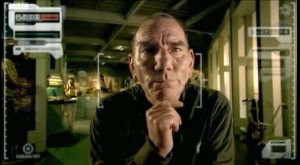 “.. we all have our self-justifying myths. We tell ourselves a story of our lives in which we almost always appear as the heroes.
“.. we all have our self-justifying myths. We tell ourselves a story of our lives in which we almost always appear as the heroes.
These myths prevent us from engaging with climate change” This is how environmental activist George Monbiot described the film “The Age of Stupid”‘s message in his review for the Guardian Newspaper.
“The Age of Stupid” is a drama-documentary -animation hybrid starring the late Pete Postlethwaite (In The Name of the Father, The Usual Suspects, Brassed Off) as a man living alone in the devastated world of 2055, watching archive footage from the mid-to-late 2000s and asking “Why didn’t we stop climate change when we had the chance?”
This 2009 British film is by by Franny Armstrong, director of McLibel and Drowned Out, and founder of 10:10, and first-time producer Lizzie Gillett. The Executive Producer is John Battsek, producer of One Day in September.
Crowdfunding and Indie Screenings are Born
Multi-award-winning documentary director Franny Armstrong (McLibel, Drowned Out) and Oscar-winning producer John Battsek (One Day In September, Restrepo) pioneered the “crowd-funding” model to finance the film, and then spent four years following seven real people’s stories to be interweaved with Pete Postlethwaite’s fictional character.
They also pioneered a new distribution system, Indie Screenings, which allows anyone, anywhere, to hold a screening of the film and keep the profits for themselves.
The film was shot in seven countries over a period of three years.
Spanner Films Channel on Vimeo
Spanner Films Channel on YouTube
Plot
The film begins in the year 2055 in a world ravaged by catastrophic climate change; London is flooded, Sydney is burning, Las Vegas has been swallowed up by desert, the Amazon rainforest has burnt up, snow has vanished from the Alps and nuclear war has laid waste to India.
An unnamed archivist (Pete Postlethwaite: In The Name of the Father, The Usual Suspects, Brassed Off) ) is entrusted with the safekeeping of humanity’s surviving store of art and knowledge.
Alone in his vast repository off the coast of the largely ice-free Arctic, he reviews archive footage from back “when we could have saved ourselves”, trying to discern where it all went wrong. Amid news reports of the gathering effects of climate change and global civilisation teetering towards destruction, he alights on six stories of individuals whose lives in the early years of the 21st century seem to illustrate aspects of the impending catastrophe.
These six stories take the form of interweaving documentary segments that report on the lives of real people in the present, and switch the film’s narrative form from fiction to fact. The people who feature are:
Al Duvernay, a Shell employee and resident of New Orleans who stayed behind and helped in the aftermath of hurricane Katrina. He reflects on what it feels like to have had all his possessions washed away in the flood, and also on his job in the oil industry and how valuable resources are being wasted.
Jehangir Wadia, an Indian businessman who talks about his low cost airline GoAir startup company and his democratic vision of a world in which all people, rich and poor, are able to afford air travel.
Jamila and Adnan, two Iraqi children who fled with their family to Jordan during the Iraq War, who tell the story of their father’s death and of their desire to be reunited with the older brother they left behind.
Fernand Pareau, an 82-year-old man who works as a guide on the Mont Blanc glacier in France – he takes an English family on a tour of the glacier and explains how he has seen the ice recede massively in his lifetime. The guide is also shown taking action against expanding road infrastructure in his area.
Piers Guy, a wind-farm developer who talks about his efforts to bring sustainable energy to an English village, and how he is being blocked by people who profess a commitment to fighting global warming but do not want wind turbines destroying their views. His family takes action in reducing their carbon footprint and contemplate the effects of air travel.
Layefa Malemi, a Nigerian woman who struggles with poverty despite the wealth of oil in her country. She talks about her ambition to study medicine and the everyday impact of the exploitation of oil by Shell Nigeria on health, security and the environment in Nigeria.
The Film’s Release
Largest Film Premiere Ever with the Lowest Carbon Emission
The film’s UK premiere was on 15 March 2009 in London’s Leicester Square
The screening was held in a solar-powered ‘cinema tent’ and conducted without use of mains electricity. An independent audit conducted by Carbon Accounting Systems found the event’s carbon emissions to be 1% of those produced by a normal blockbuster premiere.
Linked by satellite to 62 cinemas around the UK, the premiere received a Guinness World Record for being the largest film premiere ever, based on number of screens.
During the post show discussion, President Mohamed Nasheed received a standing ovation for announcing that the Maldives would be the world’s first carbon neutral country.
Star of the film Pete Postlethwaite threatened to return his OBE if the government gave the go-ahead to the controversial Kingsnorth coal-fired power station in Kent. A month later the Government announced a change to its policy on coal – no new coal-fired power station will get government consent unless it can capture and bury 25% of the emissions it produces immediately – and 100% of emissions by 2025. This, a source told the Guardian, represented “a complete rewrite of UK energy policy”.
“Best Green Event” and Best “Live Brand Experience”
The UK premiere received the accolades of ‘Best Green Event’ from Event Awards and best Live Brand Experience in the PR Week Awards.
In the UK, The Age of Stupid was released in 62 cinemas in its opening week and hit the top of the Box Office charts (by screen average). The total run was 13 consecutive weeks, playing in 263 cinemas in all, with the longest single run being four weeks at London’s Odeon Panton Street.
The Age of Stupid was launched in Australia and New Zealand on 19 August 2009 with simultaneous green carpet premieres in Auckland and Sydney, linked by satellite to 32 cinemas in Australia and 13 in New Zealand. The film was then released in all 13 cinemas in New Zealand and many of the 32 in Australia.
Global Premier
The film was released internationally on 21 September and 22 September 2009 at the “Global Premiere”. A green carpet cinema tent in downtown New York, powered by locally sourced biodiesel, was linked by satellite to 442 cinemas across the USA and to more than 200 cinemas in more than 30 other countries, as well as another 33 countries which hosted independent screenings with no satellite link.
Popular musicians Moby and Thom Yorke from Radiohead performed live. Special guests at the New York premier included Kofi Annan, Ed Miliband, Mohamed Nasheed, Rajendra Pachauri, Heather Graham, and Gillian Anderson. Pranksters, The Yes Men, walked up the green carpet in their “survivaballs”.
Many guests arrived by low-carbon transport, including sailboat, rowing boat, electric car, bicycle, bicycle rickshaw and rollerblades.
Reception
Writing for The Guardian, environmental activist George Monbiot said that the film’s “message, never stated but constantly emerging, is that we all have our self-justifying myths. We tell ourselves a story of our lives in which we almost always appear as the heroes. These myths prevent us from engaging with climate change.”.
The Financial Times critic described the film as intelligent and provoking, giving “The wisdom of hindsight, today”.
Time Out London‘s film editor, Dave Calhoun, said, “Armstrong’s prognosis is apocalyptic, but her journalism is solid, instructive and pleasingly thoughtful,” and described the film as “entertaining and provocative”.
The Times called the film “the most imaginative and dramatic assault on the institutional complacency shrouding the issue”, saying, “The power of this shameless campaigning film is that it gives dates and deadlines. It explores options and ideas. It names culprits…”
The Telegraph‘s reviewer, Sukhdev Sandhu, said, “Bold, supremely provocative, and hugely important, [Armstrong’s] film is a cry from the heart as much as a roar for necessary change.”
Based on only 12 reviews Rotten Tomatoes gave the film a rating of 83%.
The New York Times described the film as a “much sterner and more alarming polemic than An Inconvenient Truth”. The review noted the “gallows humor” throughout the film, although the review was critical of the crude animated sequences.
The Sydney Morning Herald described the film as “a wake-up call with an elegiac tone — not quite hectoring but pressing. This is about human nature, greed and personal responsibility. It aims to scare and galvanize — and it’s pretty good at both.”
In a double-page spread under the headline “Oblivious to oblivion” The Sun‘s environment editor said “reality has caught up with the apocalyptic images.”
William Nicholson, writer of Shadowlands and Gladiator, said “I hate this film. I felt as if I was watching all my own excuses for not doing anything about climate change being stripped away from me.”
Awards
Grierson: Sheffields Awards – Best Green Doc 2008
Sunny Side of the Doc – Best Green Doc 2008
Sunny Side of the Doc – Film Most Likely To Be Cinema Hit 2008
Sunchild International Environmental Festival – First Prizes
Birds Eye View Film Festival – Best Documentary 2009
British Independent Film Awards – Best Documentary 2009 (nominated)
http://www.spannerfilms.net/films/ageofstupid
http://en.wikipedia.org/wiki/The_Age_of_Stupid
Franny Armstrong
Franny Armstrong is a British Documentary film director and former drummer with indie pop group “The Band of Holy Joy”.
She works for her own company Spanner Films and is best known for the climate change blockbuster “The Age of Stupid”, “McLibel” about the infamous McDonald’s court case and “Drowned Out” which followed the fight against the Narmada Dam Project.
As well as pioneering the use of Crowdfunding for producing independant films, she developed the innovative form of film distribution known as Indie Screenings.
Franny launched her recent carbon reduction campaign 10:10 in the UK in September 2009 and it is now active in more than 50 countries.
On International Womans Day, March 8, 2011 Franny Armstrong was named as one of the Guardian newspaper’s “Top 100 Women”, in a list which included Aung San Suu Kyi, Wangari Maathai, Gareth Pierce, Doris Lessing, Arundhati Roy and Oprah Winfrey
****************************************
There will be a Screening of the film in Enfield, London (UK) on the 12th March 2012 – more info here…
****************************************
ORGANISE A SCREENING – via www.goodscreenings.org
“Show the best, award-winning social justice filmmaking. Share films that aren’t just good – they do good too…
Welcome to the future of film distribution. Now anyone in the world can buy a license to screen these excellent films. Our cunning software will calculate the license according to who you are, where you screen and how many people you’re screening to. You can even keep the profits for yourself or your organisation, campaign or cause.”


